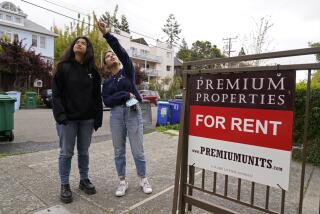Homeowners’ equity is again on the rise after three years of unprecedented shrinkage
- Share via
Reporting from Washington — With all the bad news about underwater homeowners and strategic walkaways, you might think that U.S. homeowners’ equity holdings are continuing to slide. But a little-publicized recent statistic on real estate is that home equity is again on the rise.
Is that some piece of rosy propaganda put out by housing lobbyists to stimulate more home buying? Not unless you consider Federal Reserve economists to be shills for the real estate industry. The Fed conducts massive ongoing research into mortgage balances and home-value changes in hundreds of local markets around the country, and reports its findings quarterly.
According to the Fed’s most recent “flow of funds” survey, homeowners’ net equity grew by nearly $1 trillion from the recession’s nadir in the first quarter of 2009 through the third quarter. From June 30 through Sept. 30, equity rose by $418 billion.
That’s not impressive compared with the quarterly increases registered during the hyperinflationary housing boom years, but it could signal something important: After three years of unprecedented shrinkage in home equity -- and three years of rapid expansion in the number of underwater borrowers with negative equity -- there are signs the down cycle may be shifting.
Last week, online real estate valuation researcher Zillow.com released its latest quarterly numbers on negative equity in major markets. The findings were sobering, but the study also offered some hints of improvement. The overall negative equity rate among U.S. homeowners remained flat in the fourth quarter at 21.4%. But like the Fed’s numbers, that represented a decrease from the first two quarters of last year, when 22% and 23% of owners owed more on their mortgages than the estimated market value of their real estate.
Zillow’s study found that in dozens of housing markets -- including Washington, Los Angeles, San Francisco, Detroit, Miami, San Jose, Seattle and Tampa-St. Petersburg -- the percentage of homeowners with negative equity appears to be on the decline.
Some of the largest declines occurred in cities hardest hit by the recession and the housing bust -- Ann Arbor, Mich. (down 9 percentage points), Riverside (down 5.7 points) and Phoenix (down 2 points). Florida markets that have struggled with major devaluations also saw significant improvement in negative equity ratios in the fourth quarter.
On the other hand, Zillow’s study found historically high rates of negative equity continuing to prevail in key cities. In Las Vegas, for example, 81.3% of homeowners -- 256,000 households -- were still underwater on their mortgages in the fourth quarter. This number is down from 82.5% in early 2009, but that’s no consolation to the affected owners.
In Phoenix, 61.5% of borrowers were in negative territory -- 2 points lower than in the previous quarter, yet still high.
Which major markets have the lowest underwater rates? As you might guess, they tend to be areas where the equity boom never quite boomed, and where toxic mortgages and fog-the-mirror underwriting by lenders were never the rage: Tulsa, Okla. (4.2%), Harrisburg, Pa. (5.7%), Binghamton, N.Y. (5.6%), and Peoria, Ill. (8%).
Negative equity rates are crucial barometers of local housing markets’ propensity to experience high rates of default, foreclosure and strategic walkaways. Communities with single-digit negative equity rates tend to have lower rates of walkaways and foreclosures.
The reverse is the case in areas where large numbers of underwater homeowners see no economic rationale for continuing to send in their monthly mortgage payments on properties worth tens or even hundreds of thousands of dollars less than the principal balance owed to the bank. They believe they are throwing away money on albatross real estate.
Mortgage market analyst Laurie Goodman, senior managing director of Amherst Securities, recently warned lenders to be especially vigilant about borrowers in markets where negative equity ratios are high. Once underwater borrowers miss just one payment on their mortgage, according to Goodman, there is a 75% to 80% probability that they will chuck the whole deal.
Borrowers with even minimal positive equity, on the other hand, are far less likely to do the same.
Distributed by the Washington Post Writers Group.
More to Read
Inside the business of entertainment
The Wide Shot brings you news, analysis and insights on everything from streaming wars to production — and what it all means for the future.
You may occasionally receive promotional content from the Los Angeles Times.










